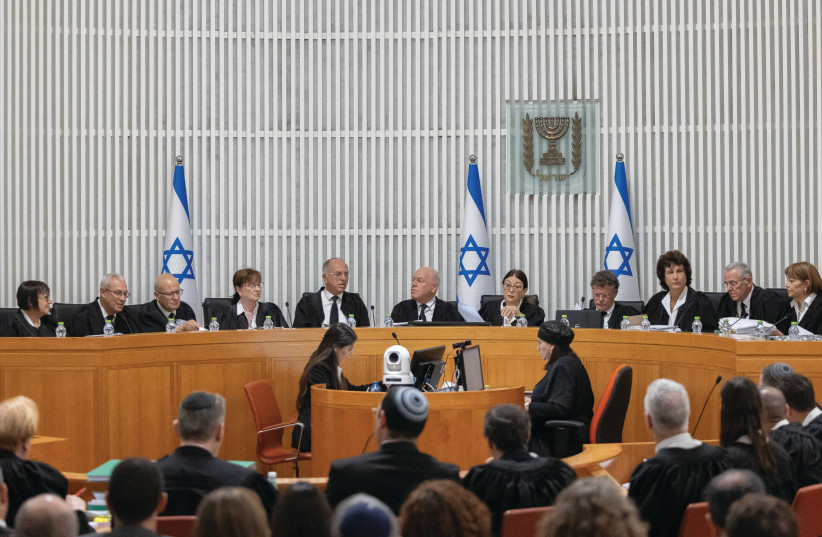The High Court of Justice on Sunday set this Thursday as the climactic deadline to resolve the year-long battle between State Comptroller Matanyahu Englman on one side and the IDF and Attorney-General Gali Baharav-Miara on the other over probing certain failures related to the October 7 disaster and related ongoing security problems.
Reading between the lines of the claims made by the lawyers from both sides at Sunday’s hearing, it seemed the IDF was playing for time, hoping to reach a ceasefire in Lebanon before it has to cooperate with the comptroller, while Englman has lost patience with giving extensions to the military.
In the background may be the IDF’s belief that once there is a ceasefire in Lebanon, various parties will finally succeed at getting Prime Minister Benjamin Netanyahu to agree to a state commission of inquiry, which would sideline the comptroller probe or make it less important.
The IDF has suspected that Englman is more aligned with Netanyahu and will place more of the blame for October 7 on the IDF. The military also views the prime minister – as the architect of the containment, deterrence, and payment (allowing Qatar to bring funds to Hamas) security strategy for Gaza – as equally responsible.
Furthermore, the military has said Netanyahu’s judicial overhaul campaign in 2023 weakened the military in the eyes of Hamas.

Two more weeks needed
From January until July, the High Court essentially sided with the IDF and held the comptroller at an arm’s distance, saying the war was too current and intense to expect military commanders to divide their time between fighting and being probed.
However, in July, the court began shifting toward mild pressure on the IDF to reach a compromise with the comptroller, and on October 14, it started putting heavier pressure on the military.
Essentially, the court’s position emerged that even if a state inquiry were preferable, given the absence of one, a comptroller probe – with certain parameters – was preferable to no outside probe.
During that October 14 hearing, Justices Noam Sohlberg, David Mintz, and Yael Wilner gave the IDF three weeks to make more compromises toward Englman, after which, if there was no deal between the sides, they threatened to issue a binding decision.
After three weeks, however, enough progress was made for the court to give the sides another week to reach an elusive deal.
At the hearing on Sunday, lawyers for the attorney-general and the IDF said that the sides had solved most of the disagreements concerning which issues the comptroller could probe with the war still ongoing as well as what the mechanism would be for passing on classified IDF information and what would or would not be allowed for interviewing commanders.
However, the comptroller’s lawyers gave the IDF only partial credit. They said the IDF had seemed to show flexibility for a few weeks but in recent days had reverted to a more rigid, less cooperative position.
While the lawyers for the IDF and the attorney-general said that a deal could be reached in a matter of days or weeks, the comptroller’s lawyers said that the problem was not time but, rather, the IDF’s inflexibility on some of the remaining issues. In addition, they said that the Shin Bet (Israel Security Agency) and Prime Minister’s Office are more cooperative with their requests than the IDF.
However, sources indicated to The Jerusalem Post that the Shin Bet and PMO have not yet had to provide some of the sensitive documents and interviews to the comptroller that are being requested of the military.
Some of the current progress was made after Englman took the unprecedented step of pleading to the justices himself in a classified hearing last month, whereas usually, one of his lawyers would speak on his behalf.
In mid-July, the court told the sides to reach a deal by October 31. It was such a long period of time to negotiate that the IDF essentially ignored the comptroller during that period, especially from late July to late August – over the killing of Hezbollah chief Fuad Shukr and Hamas chief Ismail Haniyeh while in Tehran – and again since mid-September as the IDF decapitated much of Hezbollah and the Islamic Republic attacked Israel head-on.
However, the Post understands that during his personal time with the judges, the comptroller helped convince them that his intentions to probe were pure and could conceivably help fix some problematic issues, but if kept limited, they would not help Netanyahu avoid a potential state inquiry at a later time.
Publicizing security gaps related to the Supernova music festival on October 7, to security relating to east Jerusalem, and to dealing with the drone threat, as well as other home front defense issues, could help save lives in the future.
Since August, it has been relatively clear that the latest version of the fight between IDF Chief of Staff Lt.-Gen. Herzi Halevi and Englman is not just about how busy the military is but also about who will determine the narrative regarding who is at fault for October 7.
Earlier this year, the IDF also said it might make sense for Englman to carry out a probe but not before the IDF carried out its own October 7 probes.
However, from March until August, the IDF kept changing the date for when it would publish its own probes. In August, the IDF decided to indefinitely delay publishing them, although it had committed to doing so first in June and then in August.
There are still no near-term plans to publish the probes.
